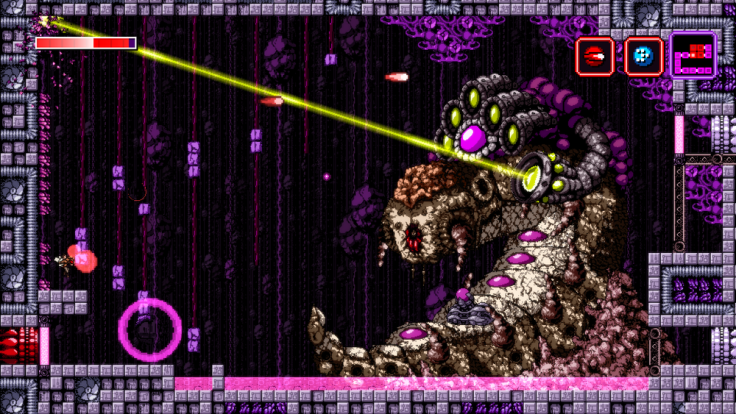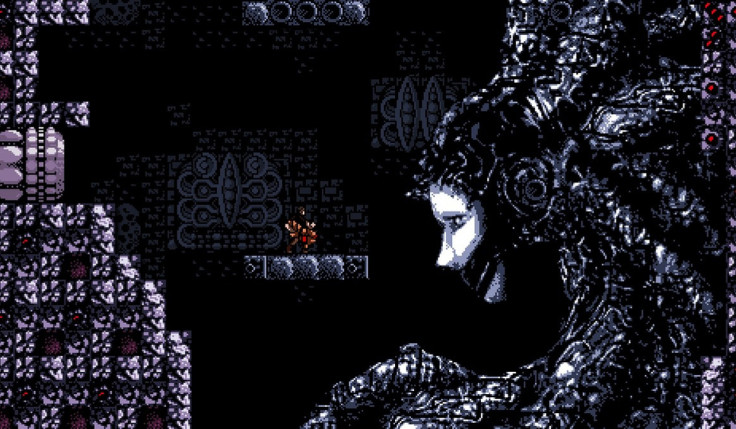Axiom Verge review: Sci-fi metroidvania bursting with imagination

Axiom Verge
Platforms: PS4 (tested), PC.
Developer / Publisher: Tom Happ
Release Date: Out Now
Axiom Verge is a labour of love - an homage to Metroid, to science fiction, and to the craft of making video games.
Tom Happ spent five years developing this ode to metroidvanias past - first as a side project then as his main focus.
Amazingly he did so as the sole developer, putting together every area, every enemy and the game's entire score.
From the very beginning Axiom Verge wears its inspirations on its sleeve, embracing the legacies of its forefathers and in doing so easing the player into something familiar before surprising them with plenty of new.
For the uninitiated, metroidvanias are a genre of game that draw together 2D platforming with RPG elements and open, explorable worlds. Verge borrows most from the Metroid half of metroidvania, particularly its science fiction stylings and feeling of isolation.
That influence can be seen from the off, as lead character Trace discovers himself in a strange, alien world following a catastrophic scientific experiment gone awry at the lab where he works. That world is brought to life with 16-bit-style visuals that immediately evoke the original Metroid.

Rather than looking exactly how that and other games like it once did however, Verge is closer to how we remember those games with the benefit of hindsight. The colour palettes and certain design aspects are familiar, but all of it is imbued with modern technical flourishes.
Bosses explode into clouds of pixels, screens are busier and then there are the obvious advantages of a steady framerate and 1080p.
In terms of sound design too Axiom mixes the familiar with the new. Gunfire, enemy snarls and the music all sound retro, but are of such quality and mixed together so well that they clearly couldn't ever had existed before.
Happ's evocative soundtrack aids in creating Verge's alien atmosphere. There is an otherness to this world that makes exploration a hoot, but that lessens the closer the player gets to the end as they re-tread paths for the fourth or fifth time.
Elements of the environment are repurposed a few times with different colour schemes (much like in the games that influenced it) which is kitschy and works fine until the joke wears a little thin. There are parts of this world that feel alive and lived in – ancient ruins drenched in snow, rooms consumed by alien vegetation – but others feel more like sets, cut-and-paste jobs from other parts of the game, even if that isn't necessarily the case.
As I started to notice these things the game's traversal issues also became more of a problem. Axiom Verge has a huge world, and being a metroidvania the player is expected to backtrack often. More often than not these journeys from one side of the map to the other feel arduous, and could have been overcome with a simple fast-travel feature unlocked around the start of the final third.
It's only ever a real problem when the player has no idea where to go next. Trace's next goal is often poorly defined, leaving players lost and wandering around aimlessly until they find a solution.

It doesn't seem to fit with how delightfully forgiving Verge otherwise is, despite its many (fair) challenges. Death doesn't necessarily mean a do-over here, so if the player defeats a boss but dies before they can reach a save-point that boss remains vanquished and their progress on the map still marked.
Save points are really just checkpoints, with your momentary demise often meaning you'll have to figure out a problematic pathway a few times on the way to the next available opportunity to take pause.
The real challenge of Verge comes from the combat, which is part Metroid, part Contra, requiring surprising dexterity and forethought with various weapons and techniques essential for the toughest adversaries.
And boy are there a lot of weapons. Trace discovers a large and varied array to use throughout the game, with upgrades to those as well as health and power pickups found with pleasing regularity. There are lightning guns, flamethrowers, guns that fire at right angles and all manner of excellent ways to dispatch enemies, even if in reality you only need a handful to beat the game.
Some have criticised Axiom Verge for not pushing the envelope enough, but I believe it does plenty. There's no seismic shift that will change metroidvanias forever, but modern technology and development techniques have focused the very best parts of all those that helped define the genre, in turn creating one of its most refined examples to date.
For all of that to be the work of one man is simply incredible. Tom Happ's achievement developing a game of such depth and quality is without doubt one of the greatest development success stories of recent years. The reasons why include a wealth of imagination, the support of one of the industry's biggest companies and most importantly of all - a clear and undying love for video games old and new.

© Copyright IBTimes 2025. All rights reserved.




















